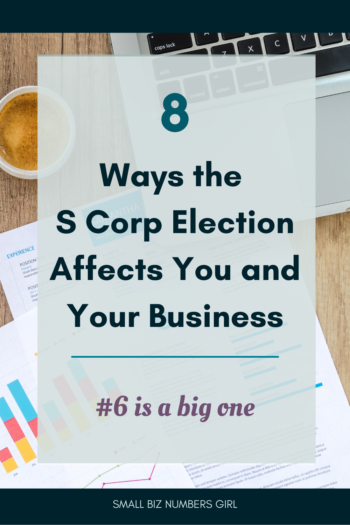8 Ways the S Corporation Election Affects You and Your Business
Thinking about taking the S corporation election for your business?
Businesses taxed as S corporations enjoy many tax benefits over those that are treated as Schedule C filers; it has the potential to save biz owners bucket loads of moolah in taxes. That’s why many small business owners elect the tax status for their business. However, while the election has major tax advantages, it is a HUGE decision. And it’s definitely not for every business. Once a business chooses S corporation status, taxes will never be the same again. Here are a few of the changes you can expect to come along with the election.


1 – Tax savings, baby!
When you elect S corp tax treatment for your business, you technically stop being considered “self-employed”. And since that’s the case, you also wouldn’t have to pay self-employment tax anymore. (Wha what!)
Compare that to owner’s who have sole proprietorships, partnerships, or LLCs. They have to pay 15% (give or take) in self-employment tax on their business income—on TOP of the regular income tax. That’s an automatic savings for you just by taking the election.
2 – Your business needs to file a separate returns
When your business becomes taxed as an S corp, it will need to file its own returns; on the federal side, that would be the form 1120-S. On top of business income and expenses, you will need to report in-depth financial and business information, including differences between book and tax income, financial balances, and shareholder information and the proportional share of income and tax items.
Even though your business is filing the returns, there’s one thing that doesn’t change—the owner will still be liable for the taxes. Along with the 1120-S, the business will also prepare what is called Schedule K-1s for each shareholder (owner), which will provide her/his share of the business income and other tax items. The owner will then report these items on the individual return (more specifically, Schedule E) and pay the taxes on it.
S corporation tax forms are due March 15 (or next business day) each year for calendar-year businesses.
3 – You’ll need to prepare complete financial statements
Like I mentioned earlier, your business is going to have to report more detailed financial information once you elect S corp status. This means that if you aren’t already, you’re going to have to show your books a LOT of love. At minimum, you’re going to need to prepare an income statement and a balance sheet each year. You will also need to calculate any book/tax differences and prepare any adjustments.
4 – You’re going on payroll—whether you like it or not
With an S corporation election, you’re no longer self-employed. Which means that if you continue to do work in your business, you’re an employee. And employees go on payroll.
You will need to pay yourself on a regular basis, and the wages you are paid should be reasonable for the work that you do. And since these are paychecks, your business will need to withhold taxes from each payment, as well as pay payroll taxes.
5 – How much you can put away for retirement will change
Contributions to your retirement plans play a major role in both retirement planning and tax planning. How much can be contributed to business retirement plans depend on how much compensation you earned from the business; usually, the more compensation you have, the more can be contributed into your plan.
For self-employed taxpayers, that compensation is based on self-employment (business) income. However, since owners of businesses treated as S corporations are no longer “self-employed”, the compensation is not based on business income, but rather the wages you are paid from the business. Since wages tend to be smaller than business income, your retirement contributions will be impacted.
6 – You can’t take the home office or business use of vehicle deductions…sort of
The home office and business use of vehicle deductions are actually perks for Schedule C filers. As the owner of an S corp-taxed business, you would not be able to take these deductions, at least not directly. However, there is a workaround.
Instead of you taking the deduction, the business would reimburse you as an employee for your home and vehicle expenses, proportionate to the percentage you use them for business of course. When the business reimburses you, it will be able to write it off as a business deduction; and since you’re the one who pays the taxes, the business deductions actually pass through to you anyways, so you still get the benefit. Your business should reimburse you under an accountable plan. An accountable plan is a formal reimbursement plan; under this plan, you should present documentation for your home and vehicle expenses to your business within a reasonable time of incurring or paying the expenses. If the business reimburses you ahead of time (advances you the money), you also need to return any excess reimbursements, if any, within a reasonable time of incurring or paying the expenses.
7 – Separating business and personal items is non-negotiable
A business that is treated as an S corporation is a separate entity from its owners. So, at least when it comes to the financial stuff, you and your business would need to stay on opposite sides of the fence. If it hasn’t already, the business will need to open and keep bank and financial accounts that are dedicated solely to business. Avoid personal expenses with business funds, and vice-versa. Also, make sure all business income gets deposited directly into business accounts. Business items should not be commingled with personal items.
8 – You’ll need to track your “stake” in the business
This is more formally known as your basis. When you make distributions to yourself out of the business, your basis will determine how those distributions are treated for tax. Basis will also play an important role in determining any taxable gain you receive when you are ready to step down from your business.
There are actually two kinds of basis an S corporation shareholder has. The first is stock basis. This basis increases with your contributions and loans to the business, along with your share of income each year. It decreases with distributions, paybacks of your loans, and your share of any business losses. The second is called debt basis. It increases with loans that you make to your business, and decreases when your business pays back the loan. It also decreases with business losses if you don’t have any stock basis left to absorb losses.
Electing S corporation tax treatment for your business can save you a ton in taxes. But it’s also a really big deal. Talk with your tax pro to see if it’s the right option for you and your business.
